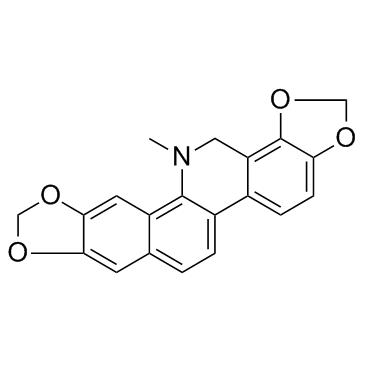Dihydrosanguinarine (13,14-Dihydrosanguinarine) (Synonyms: DHSA) |
| Catalog No.GC33965 |
Dihydrosanguinarine (13,14-Dihydrosanguinarine) is a natural compound isolated from the leaves of Macleaya microcarpa; has antifungal and anticancer activity.
Products are for research use only. Not for human use. We do not sell to patients.

Cas No.: 3606-45-9
Sample solution is provided at 25 µL, 10mM.
Dihydrosanguinarine is a natural compound isolated from the leaves of Macleaya microcarpa; has antifungal and anticancer activity.IC50 value:Target:in vitro: Dihydrosanguinarine showed much less cytotoxicity than sanguinarine: at the highest concentration tested (20 microM) and 24h exposure, dihydrosanguinarine decreased viability only to 52% [1]. Dihydrosanguinarine showed the highest antifungal activity against B. cinerea Pers, with 95.16% mycelial growth inhibition at 50 μg/ml [2]. dihydrosanguinarine showed the most potent leishmanicidal activities (IC(50) value: 0.014 microg/ml, respectively) [4].in vivo: Repeated dosing of DHSG for 90 days at up to 500 ppm in the diet (i.e. approximately 58 mg/kg/day) showed no evidence of toxicity in contrast to results published in the literature [3].
[1]. Vrba J, et al. Cytotoxic activity of sanguinarine and dihydrosanguinarine in human promyelocytic leukemia HL-60 cells. Toxicol In Vitro. 2009 Jun;23(4):580-8. [2]. Feng G, et al. Inhibitory activity of dihydrosanguinarine and dihydrochelerythrine against phytopathogenic fungi. Nat Prod Res. 2011 Jul;25(11):1082-9. [3]. Vrublova E, et al. The toxicity and pharmacokinetics of dihydrosanguinarine in rat: a pilot study. Food Chem Toxicol. 2008 Jul;46(7):2546-53. [4]. Fuchino H, et al. In vitro leishmanicidal activity of benzophenanthridine alkaloids from Bocconia pearcei and related compounds. Chem Pharm Bull (Tokyo). 2010 Aug;58(8):1047-50.
Average Rating: 5 (Based on Reviews and 3 reference(s) in Google Scholar.)
GLPBIO products are for RESEARCH USE ONLY. Please make sure your review or question is research based.
Required fields are marked with *




















